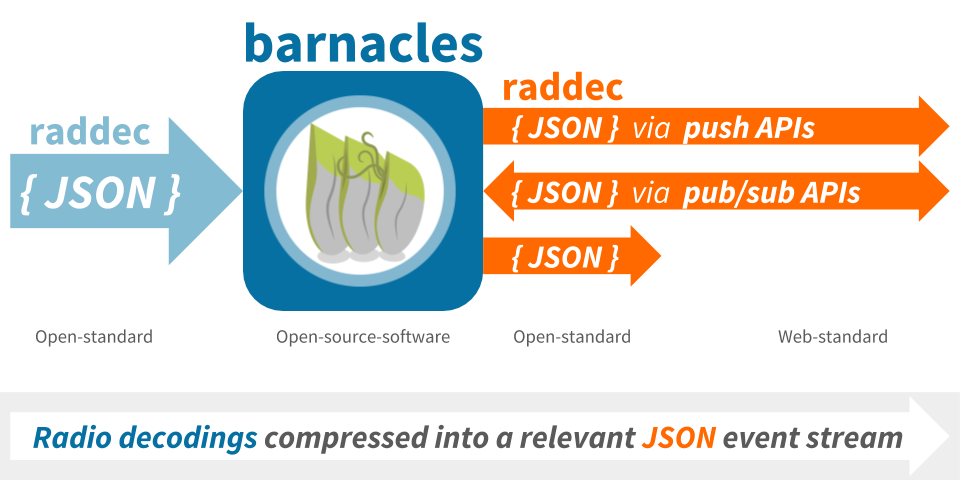README
barnacles
Efficient data aggregator/distributor for RFID, RTLS and M2M
barnacles aggregates a real-time stream of radio decodings. Based on changes in packet data (M2M) or location (RTLS) for each device, barnacles produces an event. The compressed radio decoding data can then be distributed over a network or consumed locally, as required.

barnacles ingests and outputs a real-time stream of raddec objects which facilitate any and all of the following applications:
- RFID: what is present, based on the device identifier?
- RTLS: where is it relative to the receiving devices?
- M2M: how is its status, based on any payload included in the packet?
barnacles can be coupled with advlib packet processors to additionally interpret dynamb (dynamic ambient) and statid (static ID) data for each device.
barnacles is a lightweight Node.js package that can run on resource-constrained edge devices as well as on powerful cloud servers and anything in between. It is typically connected with a barnowl instance which sources real-time radio decodings from an underlying hardware layer. Together these packages are core components of Pareto Anywhere open source software of the reelyActive technology platform.
Installation
npm install barnacles
Quick start
npm start
barnacles will listen for raddec UDP packets on port 50001 and print the aggregated raddec output to the console.
Hello barnacles & barnowl
const Barnowl = require('barnowl');
const Barnacles = require('barnacles');
let barnowl = new Barnowl();
barnowl.addListener(Barnowl, {}, Barnowl.TestListener, {}); // Source of data
let barnacles = new Barnacles({ barnowl: barnowl });
barnacles.on('raddec', function(raddec) {
console.log(raddec);
});
As output you should see a stream of raddec objects similar to the following:
{
transmitterId: "001122334455",
transmitterIdType: 2,
rssiSignature:
[ { receiverId: "001bc50940810000",
receiverIdType: 1,
numberOfDecodings: 1,
rssi: -60 },
{ receiverId: "001bc50940810001",
receiverIdType: 1,
numberOfDecodings: 1,
rssi: -66 } ],
packets: [ "061b55443322110002010611074449555520657669746341796c656572" ],
timestamp: 1547693457133,
events: [ 0 ]
}
Regardless of the underlying RF protocol and hardware, the raddec specifies what (transmitterId) is where (receiverId & rssi), as well as how (packets) and when (timestamp). barnacles adds an events property which indicates what has notably changed in the most recent radio decoding(s).
C'est-tu tout que ta barnacles peut faire?
The silly Québécois title aside (we couldn't resist the temptation), although barnacles and barnowl together may suffice for simple event-driven applications, functionality can be greatly extended with the following software packages:
- advlib to decode the individual packets from hexadecimal strings into JSON
- chickadee to associate structured, linked data with the devices identified in the radio decodings
How to distribute data?
barnacles is an EventEmitter which means that software can listen for 'raddec' events. To facilitate distribution over a network, barnacles interfaces with a number of complementary software packages to keep the code as lightweight and modular as possible. The following table lists all these interface packages which integrate seamlessly with barnacles in just two lines of code.
| Interface package | Provides |
|---|---|
| barnacles-socketio | socket.io push API |
| barnacles-webhook | Webhook (event-driven HTTP POST) |
| barnacles-elasticsearch | Elasticsearch database interface |
Example: socket.io push API
const Barnowl = require('barnowl');
const Barnacles = require('barnacles');
const BarnaclesSocketIO = require('barnacles-socketio'); // 1: Include the package
let barnowl = new Barnowl();
let barnacles = new Barnacles({ barnowl: barnowl });
barnowl.addListener(Barnowl, {}, Barnowl.TestListener, {});
// 2: Add the interface with relevant options
barnacles.addInterface(BarnaclesSocketIO, {});
Example: Webhook
const Barnowl = require('barnowl');
const Barnacles = require('barnacles');
const BarnaclesWebhook = require('barnacles-webhook'); // 1: Include the package
let barnowl = new Barnowl();
let barnacles = new Barnacles({ barnowl: barnowl });
barnowl.addListener(Barnowl, {}, Barnowl.TestListener, {});
// 2: Add the interface with relevant options
barnacles.addInterface(BarnaclesWebhook, { hostname: "127.0.0.1", port: 3000 });
Example: Elasticsearch
const Barnowl = require('barnowl');
const Barnacles = require('barnacles');
const BarnaclesElasticsearch = require('barnacles-elasticsearch'); // 1
let barnowl = new Barnowl();
let barnacles = new Barnacles({ barnowl: barnowl });
barnowl.addListener(Barnowl, {}, Barnowl.TestListener, {});
// 2: Add the interface with relevant options
barnacles.addInterface(BarnaclesElasticsearch, { host: "127.0.0.1:9200" });
Options
barnacles supports the following options:
| Property | Default | Description |
|---|---|---|
| delayMilliseconds | 1000 | How long to wait for data to arrive from all possible sources before determining if an event occurred (introduces the given amount of latency) |
| minDelayMilliseconds | 100 | Minimum time to wait between subsequent batches of event computation (gives the CPU a break) |
| decodingCompilationMilliseconds | 2000 | On an event, combine rssiSignatures from raddecs up to this far in the past |
| packetCompilationMilliseconds | 5000 | On an event, combine packets from raddecs up to this far in the past |
| historyMilliseconds | 8000 | How long to consider historic spatio-temporal data before it is flushed from memory (if historyMilliseconds is less than keepAliveMilliseconds data may be lost) |
| keepAliveMilliseconds | 5000 | How long to wait before triggering a keep-alive event in the absence of other events for a given transmitter. |
| observedEvents | [ 0, 1, 2, 3 ] | Index list of the event types to emit |
| acceptStaleRaddecs | false | Accept raddecs with a timestamp more than historyMilliseconds in the past? (timestamp gets adjusted to current time) |
| acceptFutureRaddecs | true | Accept raddecs with a timestamp in the future? (timestamp gets adjusted to current time) |
| barnowl | null | barnowl instance providing source data |
| inputFilterParameters | {} | Filter on inbound raddecs (see raddec-filter) |
| outputFilterParameters | {} | Filter on outbound raddecs (see raddec-filter) |
| packetProcessors | {} | Processors for packet data (see advlib) |
| packetInterpreters | [] | Interpreters for packet data (see advlib) |
| dynambProperties | { ... } | Packet properties to include in dynamb events |
| statidProperties | { ... } | Packet properties to include as statid |

What's in a name?
As Wikipedia so eloquently states, "To facilitate genetic transfer between isolated individuals, barnacles have extraordinarily long penises." And given the current state of isolation of nodes in today's IoT, this package (pun intended) needs "the largest penis to body size ratio of the animal kingdom".
Also, we hope the name provides occasions to overhear our Québécois colleagues say things like "Tu veux tu configurer ta barnacle!?!"
Project History
barnacles v1.0.0 was released in January 2019, superseding all earlier versions, the latest of which remains available in the release-0.4 branch and as barnacles@0.4.12 on npm.
Contributing
Discover how to contribute to this open source project which upholds a standard code of conduct.
Security
Consult our security policy for best practices using this open source software and to report vulnerabilities.
License
MIT License
Copyright (c) 2014-2022 reelyActive
Permission is hereby granted, free of charge, to any person obtaining a copy of this software and associated documentation files (the "Software"), to deal in the Software without restriction, including without limitation the rights to use, copy, modify, merge, publish, distribute, sublicense, and/or sell copies of the Software, and to permit persons to whom the Software is furnished to do so, subject to the following conditions:
The above copyright notice and this permission notice shall be included in all copies or substantial portions of the Software.
THE SOFTWARE IS PROVIDED "AS IS", WITHOUT WARRANTY OF ANY KIND, EXPRESS OR IMPLIED, INCLUDING BUT NOT LIMITED TO THE WARRANTIES OF MERCHANTABILITY, FITNESS FOR A PARTICULAR PURPOSE AND NONINFRINGEMENT. IN NO EVENT SHALL THE AUTHORS OR COPYRIGHT HOLDERS BE LIABLE FOR ANY CLAIM, DAMAGES OR OTHER LIABILITY, WHETHER IN AN ACTION OF CONTRACT, TORT OR OTHERWISE, ARISING FROM, OUT OF OR IN CONNECTION WITH THE SOFTWARE OR THE USE OR OTHER DEALINGS IN THE SOFTWARE.